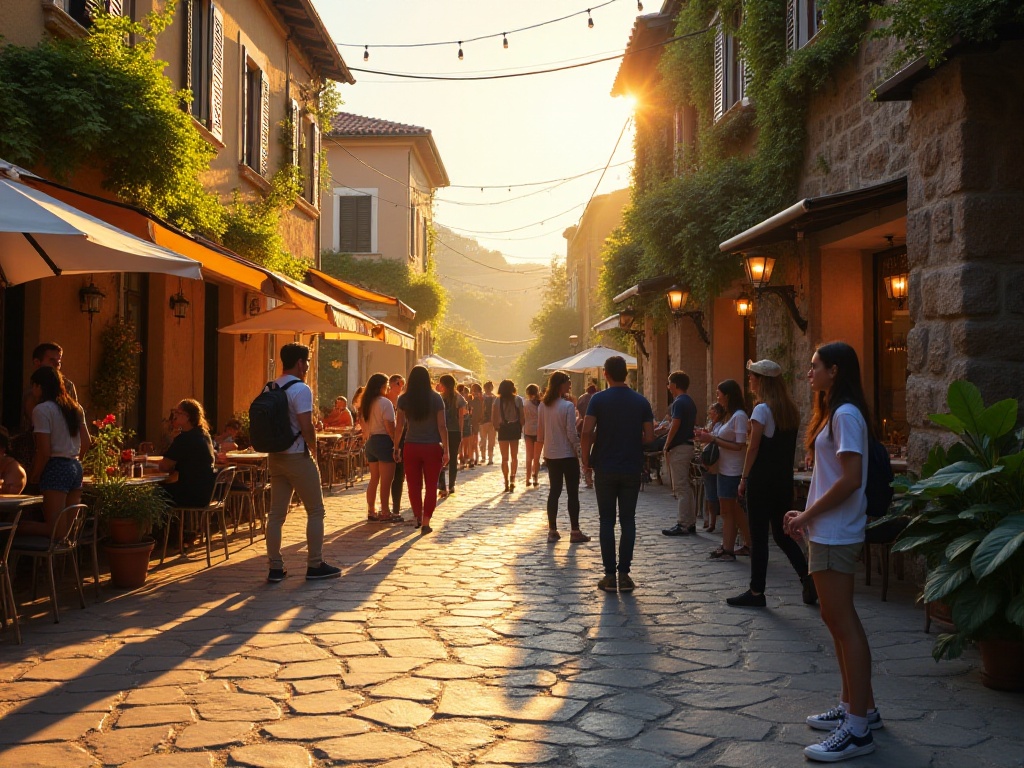Origins
I still vividly remember my first solo trip to Japan - that mix of excitement and nervousness. Besides basic phrases like "arigato" and "sayonara", I could barely speak any proper Japanese. Standing in the arrival hall at Narita Airport, watching crowds of people hurrying past and listening to rapid Japanese announcements over the PA system, I felt a deep sense of helplessness.
At that time, I felt like a novice swimmer thrown into the deep end - though I knew I wouldn't drown, I felt completely out of my element. Simple tasks like finding luggage, asking for directions, and taking the subway - things that were effortless back home - became incredibly challenging in a foreign country. Especially when shopping at convenience stores, while clerks spoke to me enthusiastically, I could only respond with confused nods and smiles. That feeling of helplessness due to the language barrier made me resolve right then: I would never let language be a barrier to travel again.
After years of exploration and practice, I've discovered that travel and language learning are a perfect match. Like wine with steak or coffee with dessert, their combination creates unexpected sparks. Today I'd like to share my experiences and insights, hoping to inspire fellow travel enthusiasts.
Language Barriers
Have you experienced situations like these? Staring blankly at a foreign menu in a restaurant abroad, finally just pointing at someone else's dish and saying "same"; wanting to chat with locals but only being able to use gestures, with Google Translate often leaving them confused; missing your bus stop because you couldn't understand the announcements, only realizing after you've reached an unfamiliar place. These are all awkward moments I've experienced.
I remember once in Seoul, I wanted to go to Myeongdong but took the subway in the wrong direction. Though my phone navigation clearly showed the route, I couldn't read the Korean station names - it was like looking at hieroglyphics. The electronic displays in the subway scrolled through various information, but they were just meaningless symbols to me. I had to ask passersby for help, but unfortunately their English wasn't very good, and some didn't speak English at all.
At that moment, I really regretted not studying Korean beforehand. Even just knowing a few basic place names would have helped! In a foreign country, language barriers are like invisible walls separating us from local culture and people. We can see the wonderful things on the other side but can never truly get close enough to touch them.
Sometimes, language barriers even make us miss rare opportunities. For instance, outside a century-old shop in Kyoto, I saw a sign covered in Japanese text but had no idea what it said. Only later did I learn from a Japanese-speaking friend that it was announcing a special limited-time promotion - what a shame to have missed it.

Turning Point
Later, I began incorporating language learning into my travel plans. Before each trip, I would start learning the destination's language three months in advance. This decision not only transformed my travel experiences but also opened up a whole new world for me.
Did you know that language learning isn't just about memorizing vocabulary and grammar? When we learn a language, we're actually understanding a nation's way of thinking and cultural characteristics. For example, Japanese honorific language perfectly reflects Japanese society's hierarchical concepts and etiquette culture, while French gender reflects French people's unique way of perceiving things.
While preparing for my trip to Spain, I spent half an hour daily learning Spanish on Duolingo. At first, it was extremely difficult - just verb conjugations gave me headaches. But after persisting, I found I could gradually understand Spanish song lyrics and watch Spanish shows without completely relying on subtitles. By the time I actually set foot in Barcelona, I could communicate with locals in simple Spanish.
That feeling of sudden enlightenment was like opening a new door, revealing a completely different landscape. On Las Ramblas, I could understand the songs street performers were singing; in Barcelona's old market, I could haggle with vendors; in front of Gaudi's architecture, I could even understand parts of the guide's Spanish explanation. This feeling was truly addictive.
During the process of learning languages, I also gradually discovered some interesting patterns. For instance, mastering basic daily expressions in a language doesn't actually take that long. Just 30 minutes to an hour daily for three months is enough to handle basic travel scenarios. Moreover, learning a second foreign language is often easier than the first because you've already mastered language learning methods and techniques.

Deep Experience
Through these years of experience, I've discovered that improved language ability brings unexpected rewards to travel. When you can communicate in the local language, your entire travel experience undergoes a qualitative change. You're no longer just a passing tourist but a traveler who can truly integrate into local life.
For example, at an izakaya in Tokyo, because I could speak Japanese, I not only ordered the owner's recommended hidden menu items but also heard the story of the shop's three generations of history. It turned out this small shop was opened by his grandfather after World War II, initially just a simple oden stand. Later, through his father's improvements, it gradually developed into its current scale. The owner even brought out a yellowed photo album from the kitchen to show me pictures of his grandfather when he was young. Mind you, this shop had even received a Michelin recommendation. Without speaking Japanese, I might never have discovered these interesting details.
In Provence, southern France, because I knew some French, I received an invitation from a local elderly lady to visit her private garden full of lavender. This grandmother had been tending this garden alone for over fifty years, treating each lavender plant like her child. She shared with me the secrets of growing lavender and taught me how to make sachets with fresh lavender. These opportunities to deeply understand local life are priceless.
Statistics show that among Chinese tourists visiting Provence in 2023, less than 5% could communicate simply with local residents. However, tourists who spoke French had three times more opportunities for such deep experiences. This gap is reflected not only in the depth of experience but also in travel quality. Travelers who speak the local language often discover little-known restaurants, artistic shops, or attractions that are difficult for ordinary tourists to find.
In Florence, Italy, because I could speak Italian, I discovered a leather craft workshop hidden in a small alley. The master craftsman was a third-generation leather worker, and their family's craft had been passed down for nearly a century. There, I not only bought a unique handmade bag but also learned tricks for identifying genuine leather. These experiences made me deeply realize that language isn't just a tool for communication but a key to opening another world.

Learning Methods
So, how can we effectively combine language learning with travel? Through years of practice, I've summarized some practical methods that I hope will help everyone.
First is choosing immersive language courses. Last year, I spent a month in Florence, attending Italian classes every morning and practicing in markets and cafes in the afternoon. The advantage of this learning method is that you can immediately apply what you've learned in class to real life. For instance, if you learn how to haggle in Italian in the morning, you can practice at the San Lorenzo Market in the afternoon; if you learn how to describe food tastes in the morning, you can apply it when ordering at restaurants at lunch.
According to local language school statistics, students who participate in such courses improve their language skills 2.5 times faster than those who self-study. Moreover, you can meet classmates from around the world in these courses, which itself is a great opportunity for cultural exchange. I remember once when our class went together to a small town in Tuscany to taste local wine - that feeling of learning while traveling was really wonderful.
Second is making good use of technology tools. Besides the familiar Duolingo, I also recommend language exchange platforms like Hello Talk. Through this platform, I met several German friends before going to Germany, which made my Berlin trip especially warm. They not only recommended many local spots that only natives know about but also let me experience real German family life.
Statistics show that travelers using language exchange platforms extend their stay at destinations by an average of 35%. This indicates that when you can communicate with locals, you discover more places worth exploring and naturally want to stay longer. Moreover, these platforms usually have voice call functions, allowing you to practice speaking and listening skills before departure.
Third is making full use of pre-travel preparation time. I usually start learning the destination's language three months in advance. First mastering basic greetings and daily expressions, then learning practical travel-related expressions like asking for directions, ordering food, and shopping scenarios. During this process, I pay special attention to local cultural taboos and etiquette customs to avoid awkwardness due to improper language use.
Fourth is being brave enough to speak. The biggest obstacle for many people learning languages is fear of making mistakes, but this worry is unnecessary. Most locals appreciate foreigners learning their language, and even if you don't speak perfectly, they'll listen patiently. My experience is that the more you dare to speak, the faster you improve. After each trip, my speaking ability shows noticeable improvement.
Fifth is creating language environments. While in China, I often watch movies and TV shows from the destination country and listen to local music to develop language sense and understand local popular culture. I also follow social media accounts that post in the target language to learn many authentic expressions.

Unexpected Gains
Through language learning, my travels have not only become more convenient, but I've also gained many precious friendships. During my time learning tea ceremony in Kyoto, because I could speak Japanese, I made several like-minded Japanese friends. We learned tea ceremony together, watched maple leaves together, and experienced various Japanese traditional cultures together. Even after returning to China, we still keep in touch, often sharing our lives through video chat.
This cross-border friendship has made my understanding of Japan much deeper. Through their eyes, I see a real Japan, not just the surface views from tourist guides. For instance, I learned about the social pressures facing young Japanese people and their true thoughts about work and life - things that are hard to understand through pure tourism.
According to a survey of Asian travelers, over 60% of tourists who master the local language can establish lasting cross-cultural friendships, while this proportion is only 15% for those who can't communicate in the local language. These data fully demonstrate the importance of language ability in establishing deep cultural connections.
Moreover, these friendships often bring unexpected rewards. For example, when a German friend later came to travel in China, we went to many places together, rediscovering my own country from a new perspective. Through her questions and observations, I gained deeper thoughts about Chinese traditional culture.
Language learning has also cultivated my cross-cultural understanding ability. When you learn a language, you're also learning that nation's way of thinking. For instance, the "wa" culture in Japanese, romanticism in French, and precision in German all deeply influence local people's behavior patterns and values. Understanding these cultural differences not only makes travel smoother but also broadens our worldview.

New Explorations
Now, I'm learning Portuguese, preparing for my trip to Lisbon in six months. Portuguese pronunciation is quite challenging for me, especially the nasal sounds, which are really difficult to master. But whenever I think about the upcoming journey, I'm filled with motivation. I'm already looking forward to getting lost in Lisbon's small alleys, tasting egg tarts in local cafes, and chatting with locals in Portuguese.
This time I've specifically chosen a language school and plan to stay in Lisbon for two months. Besides learning the language, I want to deeply understand Portuguese culture, especially Fado music. They say only people who truly understand Portuguese can appreciate the subtle melancholy in Fado music.
Have you ever missed amazing experiences due to language barriers? Or received unexpected surprises because you could speak the local language? Everyone's travel story is unique and worth sharing and recording.
Remember, each new language is a key to opening a new world. And travel is the best way to test and improve language ability. When we communicate with people in their local language, we're no longer just passing visitors but temporary residents of this land. Let's learn while traveling and travel while learning, making our world bigger and more wonderful.
The combination of language learning and travel not only makes our journeys more colorful but also gives us a deeper understanding of this world. Each language breakthrough is a spiritual voyage; each cultural collision is a leap in thinking. In this process, we constantly grow, constantly discover the world's beauty, and constantly discover our own possibilities.


